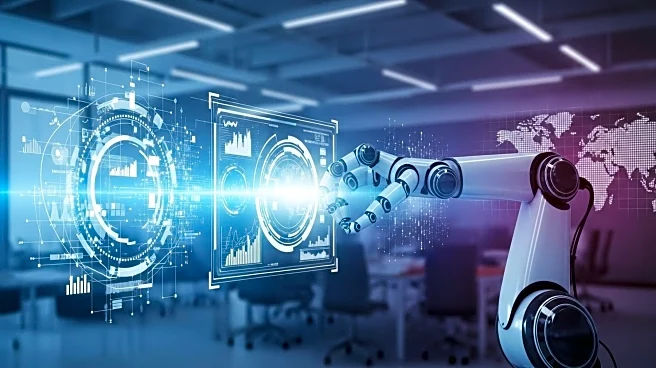What is the story about?
What's Happening?
Chinese technology companies are increasingly adopting digital employees powered by artificial intelligence (AI) agents to enhance productivity and drive digital transformation. These AI agents autonomously perform tasks, moving beyond simple chatbot functions to execute complex actions across various industries. This shift is expected to revolutionize enterprise operations by introducing 'digital employees' in roles such as marketing managers, car salespersons, and product managers. The market for AI agent marketing and sales in China was valued at 44.2 billion yuan in 2024, with projections to exceed one trillion yuan within five years. Industry experts, including Ruan Yu from Baidu, highlight the rapid evolution of AI models, which are transitioning from human-machine collaboration to autonomous AI agent forms.
Why It's Important?
The integration of AI agents into business operations signifies a major shift in workforce dynamics, potentially impacting global business practices. By automating repetitive tasks, AI agents can increase efficiency and allow human workers to focus on more creative and strategic roles. This transformation could lead to significant changes in employment patterns, with new job opportunities emerging in creative sectors. The widespread adoption of AI agents is expected to enhance decision-making processes, as they can handle complex analyses and data retrieval, thereby improving business outcomes. As AI agents become more prevalent, they may redefine traditional job roles and organizational structures, influencing industries worldwide.
What's Next?
The continued development and deployment of AI agents are likely to expand their application across various sectors, including education, finance, and consumer goods. Companies may increasingly integrate AI agents into their operations, leading to further automation of business processes. As AI technology advances, businesses will need to adapt to these changes by re-evaluating workforce strategies and training programs to accommodate new roles created by AI agents. Additionally, global consultancy firms predict that AI agents will automate or augment 50% of business decisions by 2027, indicating a significant shift in how organizations approach decision-making and operational efficiency.
Beyond the Headlines
The rise of AI agents presents ethical and legal challenges, particularly concerning data privacy and the potential displacement of human workers. As AI agents take on more responsibilities, companies must address concerns about transparency and accountability in decision-making processes. Furthermore, the cultural impact of AI agents on workplace dynamics and employee interactions could lead to shifts in organizational culture and employee engagement strategies. Long-term, the integration of AI agents may drive innovation in business models and create new opportunities for collaboration between humans and machines.















